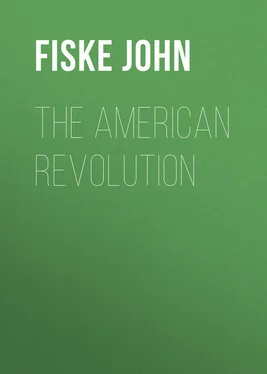John Fiske - The American Revolution
Здесь есть возможность читать онлайн «John Fiske - The American Revolution» — ознакомительный отрывок электронной книги совершенно бесплатно, а после прочтения отрывка купить полную версию. В некоторых случаях можно слушать аудио, скачать через торрент в формате fb2 и присутствует краткое содержание. Жанр: История, foreign_antique, foreign_prose, на английском языке. Описание произведения, (предисловие) а так же отзывы посетителей доступны на портале библиотеки ЛибКат.
- Название:The American Revolution
- Автор:
- Жанр:
- Год:неизвестен
- ISBN:нет данных
- Рейтинг книги:4 / 5. Голосов: 1
-
Избранное:Добавить в избранное
- Отзывы:
-
Ваша оценка:
- 80
- 1
- 2
- 3
- 4
- 5
The American Revolution: краткое содержание, описание и аннотация
Предлагаем к чтению аннотацию, описание, краткое содержание или предисловие (зависит от того, что написал сам автор книги «The American Revolution»). Если вы не нашли необходимую информацию о книге — напишите в комментариях, мы постараемся отыскать её.
The American Revolution — читать онлайн ознакомительный отрывок
Ниже представлен текст книги, разбитый по страницам. Система сохранения места последней прочитанной страницы, позволяет с удобством читать онлайн бесплатно книгу «The American Revolution», без необходимости каждый раз заново искать на чём Вы остановились. Поставьте закладку, и сможете в любой момент перейти на страницу, на которой закончили чтение.
Интервал:
Закладка:
Meanwhile, the Massachusetts legislature, at the suggestion of Otis, had issued a circular letter to all the colonies, calling for a general congress, in order to concert measures of resistance to the Stamp Act. The first cordial response came from South Carolina, at the instance of Christopher Gadsden, a wealthy merchant of Charleston and a scholar learned in Oriental languages, a man of rare sagacity and most liberal spirit. On the 7th of October, the proposed congress assembled at New York, comprising delegates from Massachusetts, South Carolina, Pennsylvania, Rhode Island, Connecticut, Delaware, Maryland, New Jersey, and New York, in all nine colonies, which are here mentioned in the order of the dates at which they chose their delegates. In Virginia, the governor succeeded in preventing the meeting of the legislature, so that this great colony did not send delegates; and, for various reasons, New Hampshire, North Carolina, and Georgia were likewise unrepresented at the congress. But the sentiment of all the thirteen colonies was none the less unanimous, and those which did not attend lost no time in declaring their full concurrence with what was done at New York. At this memorable meeting, held under the very guns of the British fleet and hard by the headquarters of General Gage, the commander-in-chief of the regular forces in America, a series of resolutions were adopted, echoing the spirit of Patrick Henry’s resolves, though couched in language somewhat more conciliatory, and memorials were addressed to the king and to both Houses of Parliament. Of all the delegates present, Gadsden took the broadest ground, in behalf both of liberty and of united action among the colonies. He objected to sending petitions to Parliament, lest thereby its paramount authority should implicitly and unwittingly be acknowledged. “A confirmation of our essential and common rights as Englishmen,” said he, “may be pleaded from charters safely enough; but any further dependence on them may be fatal. We should stand upon the broad common ground of those natural rights that we all feel and know as men and as descendants of Englishmen. I wish the charters may not ensnare us at last, by drawing different colonies to act differently in this great cause. Whenever that is the case, all will be over with the whole. There ought to be no New England man, no New Yorker, known on the continent; but all of us Americans.” So thought and said this broad-minded South Carolinian.
While these things were going on at New York, the Massachusetts assembly, under the lead of Samuel Adams, who had just taken his seat in it, drew up a very able state paper, in which it was declared, among other things, that “the Stamp Act wholly cancels the very conditions upon which our ancestors, with much toil and blood and at their sole expense, settled this country and enlarged his majesty’s dominions. It tends to destroy that mutual confidence and affection, as well as that equality, which ought ever to subsist among all his majesty’s subjects in this wide and extended empire; and what is the worst of all evils, if his majesty’s American subjects are not to be governed according to the known and stated rules of the constitution, their minds may in time become disaffected.” This moderate and dignified statement was applauded by many in England and by others derided as the “raving of a parcel of wild enthusiasts,” but from the position here taken Massachusetts never afterward receded.
But it was not only in these formal and decorous proceedings that the spirit of resistance was exhibited. The first announcement of the Stamp Act had called into existence a group of secret societies of workingmen known as “Sons of Liberty,” in allusion to a famous phrase in one of Colonel Barré’s speeches. These societies were solemnly pledged to resist the execution of the obnoxious law. On the 14th of August, the quiet town of Boston witnessed some extraordinary proceedings. At daybreak, the effigy of the stamp officer, Oliver, was seen hanging from a great elm-tree, while near it was suspended a boot, to represent the late prime minister, Lord Bute; and from the top of the boot-leg there issued a grotesque head, garnished with horns, to represent the devil. At nightfall the Sons of Liberty cut down these figures, and bore them on a bier through the streets until they reached King Street, where they demolished the frame of a house which was supposed to be erecting for a stamp office. Thence, carrying the beams of this frame to Fort Hill, where Oliver lived, they made a bonfire of them in front of his house, and in the bonfire they burned up the effigies.

Twelve days after, a mob sacked the splendid house of Chief Justice Hutchinson, threw his plate into the street, and destroyed the valuable library which he had been thirty years in collecting, and which contained many manuscripts, the loss of which was quite irreparable. As usual with mobs, the vengeance fell in the wrong place, for Hutchinson had done his best to prevent the passage of the Stamp Act. In most of the colonies, the stamp officers were compelled to resign their posts. Boxes of stamps arriving by ship were burned or thrown into the sea. Leading merchants agreed to import no more goods from England, and wealthy citizens set the example of dressing in homespun garments. Lawyers agreed to overlook the absence of the stamp on legal documents, while editors derisively issued their newspapers with a death’s-head in the place where the stamp was required to be put.
In New York, the presence of the troops for a moment encouraged the lieutenant-governor, Colden, to take a bold stand in behalf of the law. He talked of firing upon the people, but was warned that if he did so he would be speedily hanged on a lamp-post, like Captain Porteous of Edinburgh. A torchlight procession, carrying images of Colden and of the devil, broke into the governor’s coach-house, and, seizing his best chariot, paraded it about town with the images upon it, and finally burned up chariot and images on the Bowling Green, in full sight of Colden and the garrison, who looked on from the Battery, speechless with rage, but afraid to interfere. Gage did not dare to have the troops used, for fear of bringing on a civil war; and the next day the discomfited Colden was obliged to surrender all the stamps to the common council of New York, by whom they were at once locked up in the City Hall.
Nothing more was needed to prove the impossibility of carrying the Stamp Act into effect. An act which could be thus rudely defied under the very eyes of the commander-in-chief plainly could never be enforced without a war. But nobody wanted a war, and the matter began to be reconsidered in England. In July, the Grenville ministry had gone out of office, and the Marquis of Rockingham was now prime minister, while Conway, who had been one of the most energetic opponents of the Stamp Act, was secretary of state for the colonies. The new ministry would perhaps have been glad to let the question of taxing America remain in abeyance, but that was no longer possible.
The debate on the proposed repeal of the Stamp Act was one of the keenest that has ever been heard in the House of Commons. Grenville and his friends, now in opposition, maintained in all sincerity that no demand could ever be more just, or more honourably intended, than that which had lately been made upon the Americans. Of the honest conviction of Grenville and his supporters that they were entirely in the right, and that the Americans were governed by purely sordid and vulgar motives in resisting the Stamp Act, there cannot be the slightest doubt. To refute this gross misconception of the American position, Pitt hastened from a sick-bed to the House of Commons, and delivered those speeches in which he avowed that he rejoiced in the resistance of the Americans, and declared that, had they submitted tamely to the measures of Grenville, they would have shown themselves only fit to be slaves. He pointed out distinctly that the Americans were upholding those eternal principles of political justice which should be to all Englishmen most dear, and that a victory over the colonies would be of ill-omen for English liberty, whether in the Old World or in the New. Beware, he said, how you persist in this ill-considered policy. “In such a cause your success would be hazardous. America, if she fell, would fall like the strong man with his arms around the pillars of the Constitution.” There could be no sounder political philosophy than was contained in these burning sentences of Pitt. From all the history of the European world since the later days of the Roman Republic, there is no more important lesson to be learned than this, – that it is impossible for a free people to govern a dependent people despotically without endangering its own freedom. Pitt therefore urged that the Stamp Act should instantly be repealed, and that the reason for the repeal should be explicitly stated to be because the act “was founded on an erroneous principle.” At the same time he recommended the passage of a Declaratory Act, in which the sovereign authority of Parliament over the colonies should be strongly asserted with respect to everything except direct taxation. Similar views were set forth in the House of Lords, with great learning and ability, by Lord Camden; but he was vehemently opposed by Lord Mansfield, and when the question came to a decision, the only peers who supported Camden were Lords Shelburne, Cornwallis, Paulet, and Torrington.
Читать дальшеИнтервал:
Закладка:
Похожие книги на «The American Revolution»
Представляем Вашему вниманию похожие книги на «The American Revolution» списком для выбора. Мы отобрали схожую по названию и смыслу литературу в надежде предоставить читателям больше вариантов отыскать новые, интересные, ещё непрочитанные произведения.
Обсуждение, отзывы о книге «The American Revolution» и просто собственные мнения читателей. Оставьте ваши комментарии, напишите, что Вы думаете о произведении, его смысле или главных героях. Укажите что конкретно понравилось, а что нет, и почему Вы так считаете.












